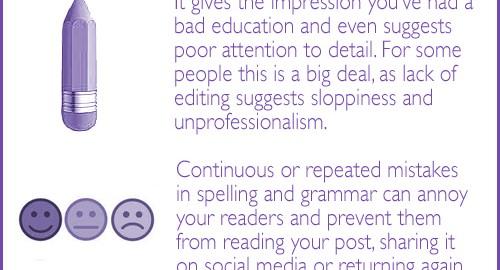Bad spelling can ruin your blog’s writing, reputation, and opportunities. This infographic explains why:
Remember your readers
Don’t put your readers off with bad spelling and grammar. They don’t deserve such treatment. If you make reading your post more difficult than it needs to be, they will probably vote with their feet and never return.
1. Don’t interrupt the flow
It’s never a good idea to disrupt your reader’s reading patterns. When they come across a bad spelling, and they recognise it as such, their natural instinct is to want to correct it. This may be even to understand what the word should be within the context of the sentence.
This forces them to stop reading, even for less than a second. But the damage has been done. The flow has been interrupted, the meaning has been lost, the process has been halted. This is even worse than having a comma in the wrong place, intentionally creating a breathing space where there shouldn’t be one.
2. Don’t slow your reader down
Readers have a natural pace in which they read comfortably. Constant interruptions due to bad spelling slows down this pace. This unnecessary stopping and starting prevents the reader from getting to the end of the sentence in one go.
This can destroy your reader’s full understanding of the sentence. Even if he returns to the beginning to read it again, the bad spelling mistake may continue to halt his comprehension, causing a blip in his reading process.
3. Don’t aggravate short attention spans
The last thing you want is to disrupt your reader’s concentration. You want them to read to the end of the sentence, the paragraph, the whole post. Unfortunately bad spelling mistakes form the equivalent of miniature barriers that prevent them from fully focusing on your post.
Readers are usually time poor, and make instant decisions whether a post is worth reading or not. Coming across a post full of bad spelling mistakes can be very off-putting, and may easily influence a negative immediate response.
4. Don’t give a poor impression
Bad spelling can put you into a poor light. It suggests you are a bad writer, even if you have been writing for years. I know there are plenty of excellent writers who have succeeded in spite of their bad spelling, but they have worked hard at getting their readers to see past this.
You may not have that opportunity right now. Therefore if you want to build up your credibility as a writer, and become recognised for what you produce, providing correctly spelled copy can only help enhance your skills along the way.
5. Don’t show up your bad education
Even if you haven’t had one! It doesn’t really matter how intelligent you are, whether you’ve been schooled at Eton and Cambridge, and whether you’ve hundreds of qualifications, your bad spelling will show you up.
Some of you may claim to be dyslexic or some other similar condition. If that is the case, your computer will help you with this. But dyslexics are known for their attention to detail and fabulous memories. Letting bad spelling mistakes happen due to a sloppy attitude won’t help you here.
6. Don’t be repetitive
There is nothing more annoying than seeing the same bad spelling mistake time and time again. Maybe once can be excused (I had to correct one in the infographic above!), but to constantly see the same mistake repeated in a post shows poor editing skills.
As I said above, this causes halts in the reading process, and to have this aggravation repeated endlessly throughout your post is intensely irritating and unnecessary.
7. Don’t use the excuse of slang
I’m always going on about writing your posts in a conversational style, as this is more attractive to your readers and makes your posts easier to read.
But this is no excuse for bad spelling. You may need to adapt your grammar slightly, as what you were taught in your English lessons may not apply here. But writing in text speak or in a similar style is not appropriate, unless you’re emphasising the vernacular or how a word should sound if the person was saying it.
What can you do about it?
It’s all very well me getting on my high horse and telling you not to let bad spelling mistakes happen in your writing. You will need to know how you can prevent this to improve the quality of your blog.
1. Use a spell checker
Your computer should conveniently add in some helpful red dots under a word it doesn’t recognise. This will immediately highlight that something is wrong, so you will be able to go back to check and correct it.
But for me I find this is not always correct. There is the difference between U.K. and U.S. English spelling, of course, but also the strange way the computer suggests corrections on sentence construction, where to place commas and even conflicts on the spelling of particular words.
And, of course, it won’t recognize a word that is in the wrong place if it is spelled correctly anyway.
2. Use a good proof reader
It doesn’t matter how many times you read your post, it is always very easy to miss an obvious bad spelling mistake. Your brain has been seeing is so often, it accepts it as being correct.
Whereas a third party will see things you were unable to notice before. Their pair of fresh eyes are not tainted by repetitive scrutiny of the same copy. And they will read it as a reader, not a writer, which makes a huge difference.
3. Use your computer’s printer
Assuming you are connected to one, print out your post onto a paper copy. Reading from paper is very different than on a screen. The light is perceived differently by your eyes, so bad spelling mistakes can be found where they didn’t appear before.
Another trick is to read aloud your post. The act of speaking it will highlight areas that don’t read properly, or show up sentences that are too long. If you can’t read it comfortably, chances are your reader won’t be able to do the same.
4. Use your pause button
Take a break. Save your post as a draft and leave a gap before looking at it again. Your brain will have had time to subconsciously go through what you have written, and more ideas or solutions will be presented the next time you look at your post.
Also, if you have written in anger, sadness, or a similar emotion, coming back to your post in a better state of mind will show up what is not suitable. You will be thankful for this later.
(233)
Report Post






